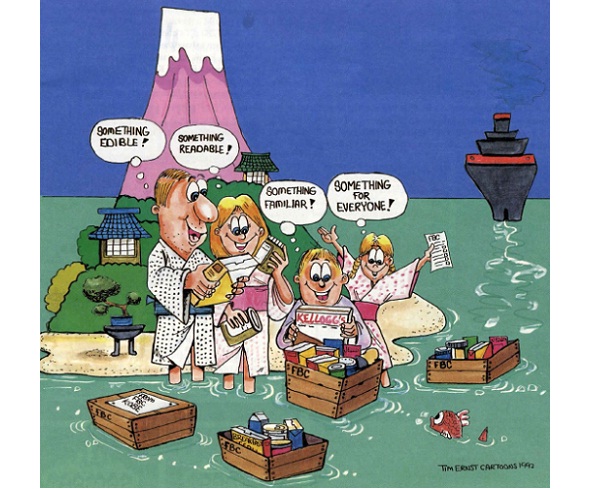by Wayne Graczyk
Our “gaijin supermarkets” in the Tokyo-Yokohama area do a pretty good job of supplying imported goods from our home countries. National Azabu, Kinokuniya, Meidi-ya, Union and Yours carry hard-to-get items and brand names that keep us in touch with home.
However, space in those markets is limited and there’s only so much they can stock of Campbell’s soup, Kellogg’s cereals, Kraft macaroni & cheese dinners, Shasta diet sodas and Folger’s coffee. Wouldn’t it be terrific if there were a place to shop in Japan, where we can get a wide variety or American products? There is!
The Foreign Buyers’ Club, based in Kobe, bills itself as “Japan’s largest home shopping U.S. grocer,” offering “great prices, home delivery, incredible selection, friendly people…” Incredible selection? Yes, FBC offers about 40,000 imported food and sundry items, from Pace Mexican Picante Sauce to Golden Sun Garlic, from Comstock Berry Patch Strawberry Pie Filling to Plax Red Dental Rinse, from Cream of Nature Shampoo to Betty Crocker Hamburger Helper.
The club was started in 1987 in the living room of Chuck and Kelly Grafft, an American couple from San Diego, Calif., who settled in Kobe and persevered through long negotiations with Japanese customs agents to get their idea approved and to begin bringing in thousands of items “in a reasonable quantity” for “personal use only” by ex-pats in Japan.
Today, the FBC serves 1,300 members and, counting family members and friends, Chuck Grafft estimates about 10,000 people throughout Japan benefit from the program. “About 85 percent of our customers are Americans or Canadians,” he says, with eight percent Japanese and seven percent from “other countries.” You, too, can join the club, and here’s how it works:
You call the FBC at (078) 857-9001, and request a membership application. Grafft will send you one, along with your first order form and a catalogue. Fill them out, mail the application and mail or fax your order. You pay a ¥1,000 annual membership fee and the amount of your order through bank transfer.
Usually, the first and third Fridays of the month are “order Fridays.” Orders and payment must be received prior to “order Friday.” The FBC then compiles and sends the orders to its supplier in California. Everything clears customs and about four weeks later, your complete order is delivered to your door wherever you live in Japan. In fact, the 33-year-old Grafft says about 60 percent of the FBC customers live in the Tokyo-Yokohama area with about 25 percent living in Kansai.
After the entire shipment arrives at the Kobe docks, it’s redistributed and sent to destinations throughout the country via Kangaroo Seino delivery service.
Sound too good to be true? It’s not, but if there’s a “catch,” it’s that you must order all items by the case, with most cases containing 12 or 24 units of the product.
To give a few examples: a 24-unit case of 10.7 oz. cans of Campbell’s Chunky Chicken Noodle Soup costs ¥4,975 (¥207 per can). A 12-unitcaseof Kellogg’s Raspberry Pop Tarts is ¥5,054 (¥421 per package). A 24-can case of Shasta Diet Root Beer is ¥1,734 (¥72 a can) and a six-unit case of extra-strength Tylenol caplets costs ¥3,998 (¥666 per unit).
The FBC also can help locating and ordering special items not on their regular list. “Someone wanted a special contact lens solution and another customer asked for a certain children’s medicine. We got them and added the products to our database,” said Grafft.
Chuck and Kelly are from San Diego, but they live with their two daughters and a cat in Kobe, where the FBC just moved into new offices and a warehouse on Rokko Island. His club employs nine office workers and about a dozen dock workers all of whom Chuck calls “your friends at FBC.”
You may be wondering how your friends at FBC make their money. Are they volunteers doing a good deed to help the community? “That’s the way it started out,” says Grafft, “but with 12 employees on the docks and serving as many customers as we do, the staff must be salaried and the rent on our office has to be paid.”
So, the FBC checks the retail price of each item and adds that on to the cost of the “CIF” charge, which stands for cost, insurance and freight. Usually, the operating charge comes out to ¥600-700 per case with a maximum of ¥1,000 per case. That minimal addition helps keep the FBC in business while still allowing customers to purchase the goods at resonable prices.
So, what’s your pleasure? Dennison’s Chili Con Carne? Chicken of the Sea Chunk Light Tuna? Franco-American Chicken Gravy? Ocean Spray Cranblueberry Drink? Carnation Chocolate Chip Breakfast Bars? Royal Cheesecake Pie Mix? Tootsie Rolls? Irish Spring Body Soap? Wash-a-Bye Baby Wipes? Mighty Dog Sliced Turkey Dog Food?
Give ’em a call. The Foreign Buyers’ Club number, once again, is (078) 857-9001. Their fax number is (078) 857-9005. The address: Foreign Buyers’ Club, East Court Two Suite #307, 1-14 Koyochonaka, Higashinada-ku, Kobe 658.
External Link:
Foreign Buyers’ Club









